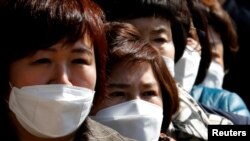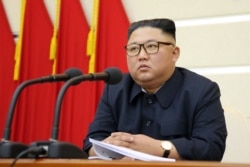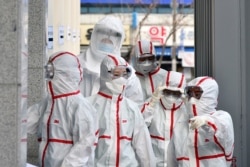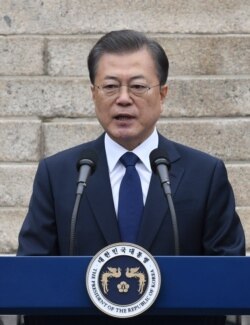North and South Korean leaders are again speaking after months of broken-down communication. This time, though, the two countries are focusing their discussions on the COVID-19 coronavirus outbreak.
North Korean leader Kim Jong Un Wednesday sent South Korean President Moon Jae-in a personal letter offering his best wishes and condolences for the latest coronavirus outbreak, Moon’s senior press secretary Yoon Do-han, said in a briefing.
While the exact contents of the letter were not released, Yoon said the North Korean leader had said he was concerned for Moon’s health and expressed frustration that North Korea can’t do much to help. The letter also shared some candid thoughts about general matters on the Korean peninsula, according to the briefing.
South Korea is in the throes of the second-largest COVID-19 outbreak in the world after China, where the virus was first detected. As of mid-afternoon Thursday, there had been at least 35 deaths and 5,766 confirmed cases of COVID-19 in South Korea, with about 75% of the cases concentrated in the southeastern city of Daegu.
North Korea closed its borders to avoid the virus in mid-February, and COVID-19 has spread to many other parts of the world. Both Italy and Iran have been dealing with thousands of confirmed cases in recent days, and South Korea is only beginning to see the number of newly detected cases slow.
"The crisis in Daegu and North Gyeongsang province reached its peak and the whole country has entered a war against the infectious disease,” Moon reportedly said during a Cabinet meeting Tuesday.
The coronavirus, as it turns out, may be the latest thing to bring the two Koreas back together. A day after receiving Kim’s message, Moon responded on Thursday with a letter of his own. Details of the letter's content have not been released.
The re-opened dialogue is a substantial turn from tensions earlier this week, when North Korea fired two short-range ballistic missiles on Monday for the first time in more than three months. At the time, Kim’s sister, Kim Yo Jong, accused South Korea of acting like a “frightened dog barking” in response to Seoul’s condemnation of the weapons test. North Korea also reportedly refused coronavirus-related humanitarian aid from the United Nations in February.
As the virus starts to become contained, however, relations between the two Koreas may have an opportunity to change.
“If South Korea begins to control its own problem, it of course has a highly advanced medical system and could move very quickly with vaccinations and testing kits once they’re mass-produced,” said C. Harrison Kim, a North Korea expert and professor at the University of Hawaii at Manoa. “I think there would then be an opportunity for North and South to share or collaborate on a humanitarian level.”











